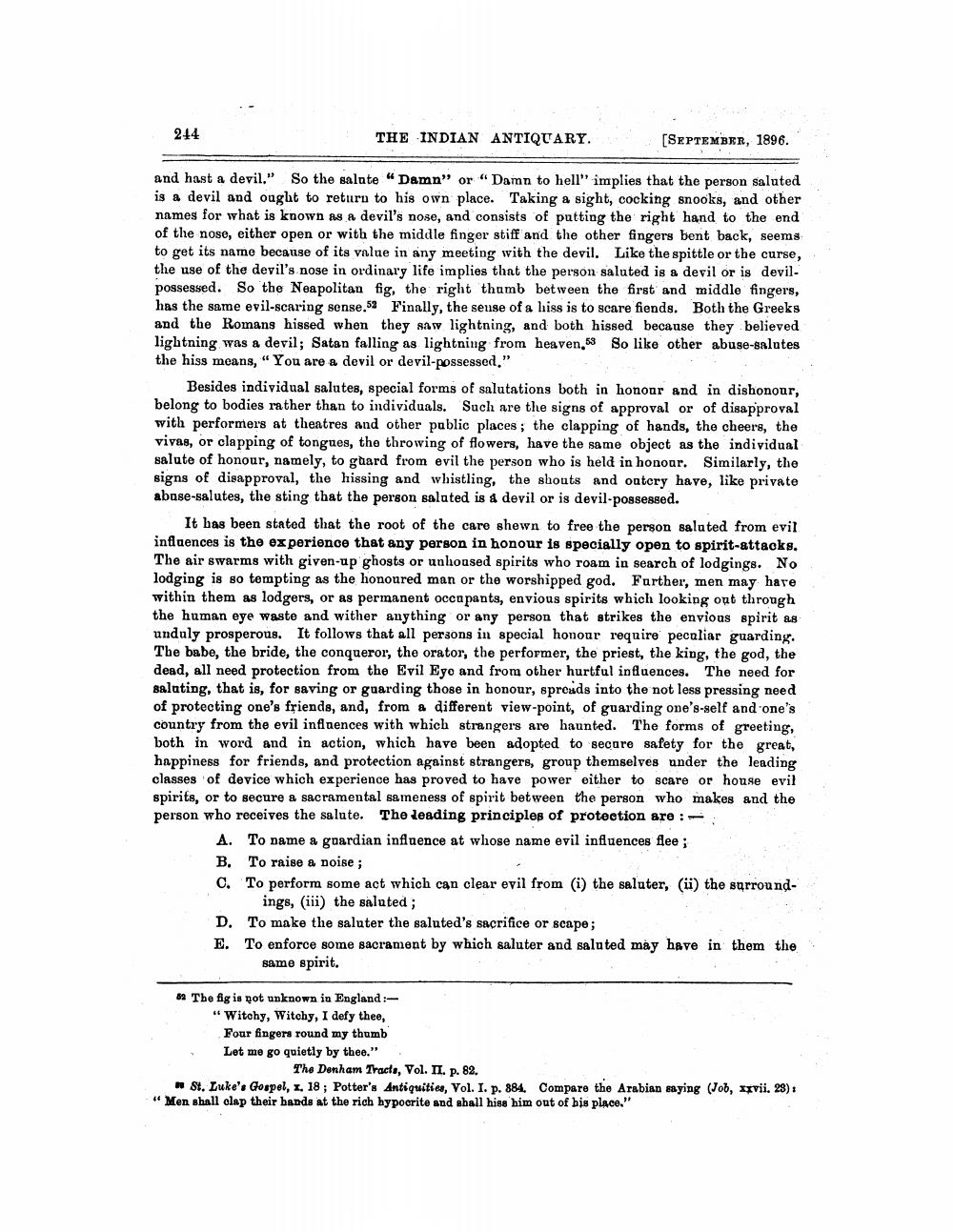________________
244
THE INDIAN ANTIQUARY.
[SEPTEMBER, 1896.
and hast a devil." So the salate "Damn" or "Damn to hell" implies that the person saluted is a devil and ought to return to his own place. Taking a sight, cocking snooks, and other names for what is known as a devil's nose, and consists of putting the right hand to the end of the nose, either open or with the middle finger stiff and the other fingers bent back, seems to get its name because of its value in any meeting with the devil. Like the spittle or the curse, the use of the devil's nose in ordinary life implies that the person saluted is a devil or is devil. possessed. So the Neapolitan fig, the right thumb between the first and middle fingers, has the same evil-scaring sense.52 Finally, the seuse of a liss is to scare fiends. Both the Greeks and the Romans hissed when they saw lightning, and both hissed because they believed lightning was a devil; Satan falling as lightning from heaven,53 So like other abuse-salutes the hiss means, “You are a devil or devil-possessed,"
Besides individual salutes, special forms of salutations both in honour and in dishonour, belong to bodies rather than to individuals. Such are the signs of approval or of disapproval with performers at theatres and other public places; the clapping of hands, the cheers, the vivas, or clapping of tongues, the throwing of flowers, have the same object as the individual salute of honour, namely, to guard from evil the person who is held in honour. Similarly, the signs of disapproval, the hissing and whistling, the shouts and outcry have, like private abuse-salutes, the sting that the person salated is & devil or is devil-possessed.
It has been stated that the root of the care shewn to free the person salated from evil influences is the experience that any person in honour is specially open to spirit-attacks. The air swarms with given-up ghosts or unloused spirits who roam in search of lodgings. No lodging is so tempting as the honoured man or the worshipped god. Further, men may have within them as lodgers, or as permanent occupants, envious spirits which looking out through the human eye waste and wither anything or any person that strikes the envious spirit as unduly prosperous. It follows that all persons in special honour require peculiar guarding. The babe, the bride, the conqueror, the orator, the performer, the priest, the king, the god, the dead, all need protection from the Evil Eyo and from other hurtful influences. The need for saluting, that is, for saving or guarding those in honour, spreads into the not less pressing need of protecting one's friends, and, from a different view-point, of guarding one's-self and one's country from the evil influences with which strangers are haunted. The forms of greeting, both in word and in action, which have been adopted to secure safety for the great, happiness for friends, and protection against strangers, group themselves under the leading classes of device which experience has proved to have power either to scare or house evil spirits, or to secure & sacramental sameness of spirit between the person who makes and the person who receives the salute. The leading principles of protection are :
A. To name a guardian influence at whose name evil influences flee; B. To raise a noise ; c. To perform some act which can clear evil from (i) the saluter, (ii) the surround
ings, (iii) the saluted; D. To make the saluter the saluted's sacrifice or scape; E. To enforce some sacrament by which saluter and saluted may have in them the
same spirit.
82 The fig is not unknown in England :
"Witchy, Witchy, I defy thee,
Four fingers round my thumb Let me go quietly by thee."
The Denham Tracts, Vol. II. p. 82. # St. Luke'. Gospel, x, 18; Potter's Antiquities, Vol. I. p. 884. Compare the Arabian saying (Job, xxvii. 28) : "Men shall alap their bands at the rich hypocrite and shall hiss him out of his place."




